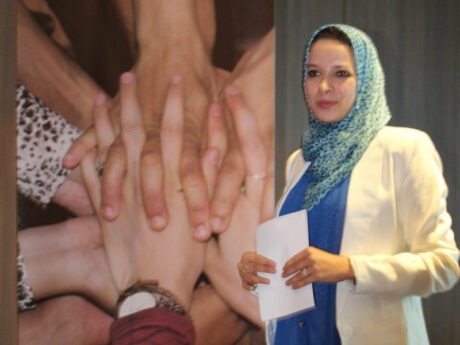Rabat, MoroccoWhile communities around the world experience violent extremism, specific drivers and solutions are best understood and applied locally, said experts at an international symposium on the role of local actors in community resilience, social stabilization and countering violent extremism.
Opening the international event in Rabat, Yasmina Sarhrouny, Chief of Party for the Fostering Peaceful Communities project in four Moroccan cities, urged to the civil society organizations, academics, researchers, religious leaders and government stakeholders in the room to think locally when it comes to addressing violent extremism.
“Usually these actors are not present at discussions of CVE,” she said on Sept. 26. “And is it only the mission of civil society? Maybe it’s a bit naïve to put civil society as the first line of defense against the rise of violent extremist ideology, without taking into account the contexts and conditions in which these actors operate at the local level. Perhaps the magic formula would be cooperation between civil society, religious actors, local elected officials and security actors.”
Sarhrouny know this to be true from experience. The Fostering Peaceful Communities project, which hosted the symposium with Search for Common Ground and the Rabat International University, worked with local actors in four Moroccan communities with high levels of violent extremist activity and recruitment to assess and address local drivers of violent extremism.
The activities ranged from preparing religious students to prevent extremism in their communities to training unemployed mothers to recognize the signs of radicalization. The approach was collaborative and involved a range of local actors. The project was implemented by Creative Associates International and funded by the U.S. State Department’s Bureau of Conflict and Stabilization Operations.
The symposium presented a holistic view of the phenomenon of violent extremism, covering psychological factors that drive extremism at the individual level, relationships within families, the role of governance institutions in the sustainable prevention of extremism, messaging and counter-messaging, and national strategic and legal frameworks.
Going wide and deep to address root cases
Sarhrouny said the symposium intentionally engaged a variety of actors and topics, recognizing extremism has many wide-reaching drivers, manifestations and effects. To find effective solutions, you must get to the core of this phenomenon, she explained.
“If violent extremism only dealt with Islam the response would be easy, but it does not,” she said. “Work on narratives and counter narratives is important, but when we look at the data it shows that the root causes are exclusion and poverty. In my opinion, many organizations and states find it easier to focus on narratives than at their own governance problems and the human rights of their citizens.”
In focusing on the issues of exclusion and marginalization, civil society representatives spoke about their work to help disaffected young women and men find nonviolent opportunities to contribute to their community, meaningfully engage with decision-makers in local government and participate in peaceful dialogue. They noted this approach was more effective than battling over ideology.
“When you try to change someone’s beliefs, it doesn’t work. It creates more resistance,” said Marouan Ben Larbi, a specialist in youth engagement from the northern region of Morocco. “But if you adopt an approach focused on inclusion and understanding – this person doesn’t need to be changed, they need to be heard. The most important thing is that the person feels the love and that they feel heard.”
Other speakers touched on the importance of addressing young men and women’s need to feel connected and empowered within their community, and to take on greater roles in decision-making and leadership.
“I am personally convinced that to address violent extremism, encouraging collective life is the first thing to do,” said Ali Lagsab, president of the Fès-based civil society organization Citoyens de Rue. “When a young person participates he or she is no longer just a consumer, but a producer.”
A global challenge
Symposium participants addressed violent extremism at the international level as well as in Morocco, with discussions about models for messaging in the Middle East and North Africa, approaches for diagnosing and addressing governance problems that can contribute to fragility, and an analysis of armed groups in Mali and the Sahel.
During breakout workshops, symposium attendees developed recommendations for engaging local actors in countering and preventing violent extremism, looking specifically at the northern Moroccan cities of Tetouan and Tangier; the large cities of Fes, Casablanca, and Rabat; and the rural and mountainous region of Beni Mellal-Khenifra.
Attendees will use the recommendations produced at the symposium to guide their research and action to preventing violent extremism using a multidisciplinary approach that mobilizes a comprehensive group of community actors.
Rabat International University will organize an additional four seminars on countering violent extremism that will continue the exploration of this complex phenomenon and expand engagement with a diverse set of local and international stakeholders.
Professor Farid El Asri, Director of the Chair for Culture, Society, and Religion in the Political Science Department of Rabat International University, says that there is still much work to be done to fully understand violent extremism and develop comprehensive, multidisciplinary, and effective approaches for preventing and countering it.
“I don’t think I have an answer, but I have many questions, and maybe a path forward.”

